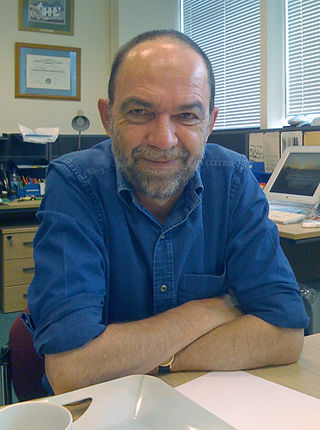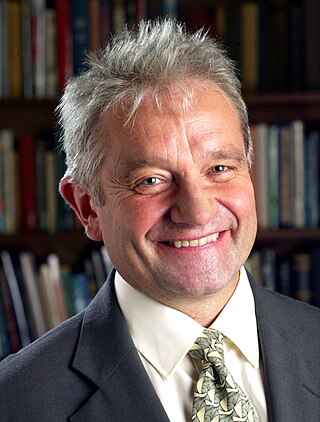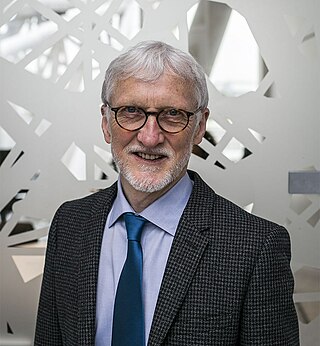Related Research Articles

Sir Alec John Jeffreys, is a British geneticist known for developing techniques for genetic fingerprinting and DNA profiling which are now used worldwide in forensic science to assist police detective work and to resolve paternity and immigration disputes. He is Professor of Genetics at the University of Leicester, and became an honorary freeman of the City of Leicester on 26 November 1992. In 1994, he was knighted for services to genetics.

George Porter, Baron Porter of Luddenham, was a British chemist. He was awarded the Nobel Prize in Chemistry in 1967.

Sir Walter Fred Bodmer is a German-born British human geneticist.

Sir Paul Maxime Nurse is an English geneticist, former President of the Royal Society and Chief Executive and Director of the Francis Crick Institute. He was awarded the 2001 Nobel Prize in Physiology or Medicine along with Leland Hartwell and Tim Hunt for their discoveries of protein molecules that control the division of cells in the cell cycle.
Sir Michael John Berridge was a British physiologist and biochemist.

Richard Henderson is a British molecular biologist and biophysicist and pioneer in the field of electron microscopy of biological molecules. Henderson shared the Nobel Prize in Chemistry in 2017 with Jacques Dubochet and Joachim Frank.„Thanks to his work, we can look at individual atoms of living nature, thanks to cryo-electron microscopes we can see details without destroying samples, and for this he won the Nobel Prize in Chemistry."

Eric Ashby, Baron Ashby, FRS was a British botanist and educator.
Christopher Frank Kearton, Baron Kearton,, , usually known as Frank Kearton, was a British life peer in the House of Lords. He was also a scientist and industrialist and former Chancellor of the University of Bath.

Dame Carol Vivien Robinson, is a British chemist and former president of the Royal Society of Chemistry (2018–2020). She was a Royal Society Research Professor and is the Dr Lee's Professor of Physical and Theoretical Chemistry, and a professorial fellow at Exeter College, University of Oxford. She is the first director of the Kavli Institution for Nanoscience Discovery, University of Oxford, and she was previously professor of mass spectrometry at the chemistry department of the University of Cambridge.
Judith Ann Kathleen Howard is a British chemist, crystallographer and Professor of Chemistry at Durham University.
Sir John James Skehel, is a British virologist and Emeritus scientist at the Francis Crick Institute in London. From 1987 to 2006 he was director of the National Institute of Medical Research (NIMR) at Mill Hill which was incorporated into the Crick Institute in 2016.
Austin Gerard Smith is a professor at the University of Exeter and director of its Living Systems Institute. He is notable for his pioneering work on the biology of embryonic stem cells.

Dame Julia Mary Goodfellow is a former Vice-Chancellor of the University of Kent, and Chair of the British Science Association. She was the president of Universities UK from 1 August 2015 until July 2017.

Michael Richard Edward Proctor is a British physicist, mathematician, and academic. He is Professor of Astrophysical Fluid Dynamics at the University of Cambridge and, since his election in 2013, the Provost of King's College, Cambridge and school governor at Eton College.

Iain William Mattaj FRS FRSE is a British scientist and Honorary Professor at Heidelberg University in Germany. From 2005 to 2018 he was Director General of the European Molecular Biology Laboratory (EMBL). He stepped down from the position at the end of 2018 following his appointment to Human Technopole. In January 2019 he took office as the first Director of Human Technopole, the new Italian institute for life sciences in Milan, Italy.
Stephen Mann, FRS, FRSC, is Professor of Chemistry, co-director of the Max Planck Bristol Centre for Minimal Biology, director of the Centre for Organized Matter Chemistry, director of the Centre for Protolife Research, and was principal of the Bristol Centre for Functional Nanomaterials at the University of Bristol, UK.
Sir David Ian Stuart is a Medical Research Council Professor of Structural Biology at the Wellcome Trust Centre for Human Genetics at the University of Oxford where he is also a Fellow of Hertford College, Oxford. He is best known for his contributions to the X-ray crystallography of viruses, in particular for determining the structures of foot-and-mouth disease virus, bluetongue virus and the membrane-containing phages PRD1 and PM2. He is also director of Instruct and Life Sciences Director at Diamond Light Source.

Anne Neville was the Royal Academy of Engineering Chair in emerging technologies and Professor of Tribology and Surface Engineering at the University of Leeds.

Sir Richard Henry Treisman is a British scientist specialising in the molecular biology of cancer. Treisman is a director of research at the Francis Crick Institute in London.
Caetano Maria Pacheco Pais dos Reis e Sousa is a senior group leader at the Francis Crick Institute and a professor of Immunology at Imperial College London.
References
- 1 2 3 4 5 "GOODFELLOW, Prof. Peter Neville" . Who's Who . Vol. 1993 (online Oxford University Press ed.). Oxford: A & C Black.(Subscription or UK public library membership required.)
- ↑ Louis-Jeantet Prize
- 1 2 Goodfellow, Peter Neville (1975). Biochemical and Genetic Studies of Human Tissue Antigens. bodleian.ox.ac.uk (DPhil thesis). University of Oxford. OCLC 500453850.
- ↑ "Faculty of Science: Alumni and friends". bristol.ac.uk. Archived from the original on 20 August 2014.
- ↑ "Peter Goodfellow: Executive Profile & Biography". Businessweek.com. Archived from the original on 13 September 2014. accessed 9 April 2016.
- ↑ Louis-Jeantet Prize
- ↑ "Honorary degrees at Bristol University". bristol.ac.uk.